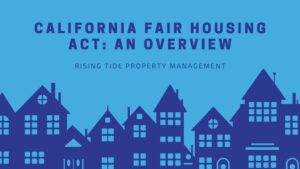California Fair Housing Act: An Overview
As a landlord in California, you have certain legal responsibilities that you must take seriously. One of these is the Fair Housing Act. This legislation requires landlords to treat their tenants fairly and equally in all interactions, whether that is during rental advertising, tenant screening, or responding to repairs.
Fair housing violations can be costly. They can include civil penalties, actual damages, and even punitive damages. These can range from a few thousand- to hundreds of thousands of dollars. There may be other consequences as well. In severe cases, you could be liable to injunctions, attorney fees, and criminal penalties.
With this in mind, the following is everything you need to learn about the Fair Housing Act in California.
What Is the Federal Fair Housing Act?
The Fair Housing Act (FHA) was enacted on April 11, 1968. It was passed by the U.S. Congress and signed into law by President Lyndon B. Johnson. At the time, discrimination in rental housing was rife, particularly against African Americans and other minority groups.
Landlords, for instance, would refuse to rent out their properties to renters based on their religion, race, color, and nationality.
As a result of such actions by landlords, there was significant inequality and segregation.
Over the years, however, the Fair Housing Act has helped millions of Americans gain access to quality homes. The act made it illegal for landlords to discriminate against tenants based on 7 classes.
The 7 protected classes are race, color, religion, nationality, familial status, disability, and sex.
What Does the California Fair Housing Laws Prohibit?
The Federal Fair Housing Act applies to all states. Additionally, some states like California have added extra protections to cover more groups.
California has two primary fair housing laws, the Fair Employment and Housing Act (FEHA) and the Unruh Civil Rights Act. However, the Unruh Act focuses primarily on business establishments.
The California Fair Employment and Housing Act prohibits discrimination and harassment in both employment and housing. Enacted in 1959, it prohibits discrimination in all aspects of housing, including buying, renting, selling, and financing.
In addition to what is covered by the federal fair housing laws, FEHA – the California fair housing law – adds the following classes.
- Gender identity and gender expression.
- Marital status.
- Sexual orientation.
- Arbitrary characteristics.
- Age.
- Military or veteran’s status.
- Citizenship, immigration status, or primary language.
- Source of income.
- Ancestry.
What Are the Examples of Fair Housing Violations in California?
The following actions are illegal as a landlord.
- Discriminating against a tenant based on their gender identity. This can take many forms. For instance, providing such tenants inferior services, denying their rental application, or self-evicting them. Learn more about California’s Eviction Laws.
- Discriminating against a tenant based on their sexual orientation. California fair housing laws require landlords to treat tenants fairly regardless of their sexual orientation. You cannot, for instance, advertise a preference for or against an applicant because of their sexual orientation.
- Discriminating against a tenant based on their marital status. Whether an applicant is single, married, or divorced, you must accord them fair and equal treatment. Showing preference or limitation based on their marital status would be illegal.
- Discriminating against a tenant based on their age. Age shouldn’t factor in when you’re choosing a tenant to rent your unit. A few exceptions exist, though.
- Discriminating against a tenant based on some of their arbitrary characteristics. Examples of such characteristics include piercings, tattoos, or an uncommon hairstyle.
- Discriminating against a tenant based on their income source. You must treat every tenant equally, as long as their source of income is legal, regular, and verifiable. You cannot, for instance, set income requirements artificially high to exclude an applicant who receives public benefits.
- Discriminating against a tenant based on their ancestry. An example would be refusing to rent to someone because of their family’s country of origin. Or, charging a tenant a higher security deposit solely based on their ancestry. Check out this article to learn more about California’s Security Deposit Laws.
Other Forms of Tenant Discrimination
- Falsely claiming your unit isn’t available when it is.
- Drafting a lease with policies that result in unfair housing access.
- Asking discriminatory screening questions. For example, are you married? Do you have children? Is that a service dog?
- Using discriminative language in your rental ad. For instance, “Singles are Preferred,” “Ideal for Hispanic Families,” “Christian Community,” “Female Roommate Only,” or “Ideal for Couples.”
- Refusing to accept reasonable requests for accommodations and modifications from disabled tenants.
What Are the Exemptions to the Fair Housing Act?
Some limited exemptions to the fair housing laws exist. Below are some of them.
- Religious organizations and private clubs can deny housing to members who don’t have membership.
- Landlords can limit occupancy to a maximum number of renters in locations where there are maximum occupancy rules.
- An owner-occupied housing that has a maximum of four total units.
- Housing designated for people older than 55 years.
How Can Landlords Provide Fair Housing?
When renting out a property in California, you’ll want to formulate policies that treat every tenant fairly. The following are the key areas to focus on.
- Rental Advertising. Focus on describing your rental property’s features rather than your ideal tenant.
- Rental Pricing. Charge a consistent rental price for all tenants.
- Tenant Screening. Ask the right screening questions that don’t focus on any of the applicant’s protected classes.
- Repairs and Maintenance. Have policies that ensure tenants’ requests are handled fairly and equally.
Bottom Line
Savvy landlords know that the key to their success lies in how they treat quality tenants. They treat them fairly and equally because they value them and want to keep them for as long as possible.
For landlords, staying informed and compliant with all relevant laws and legislation, such as landlord-tenant laws is crucial. Have a question or need help navigating the legalities of renting out your units? We’re happy to help.
At Rising Tide Property Management we provide unmatched property management services to property owners in the South Bay and Long Beach areas. Get in touch to learn more!
Disclaimer: Please note that the information provided in this blog is intended for general guidance and should not be considered as a replacement for professional legal advice. It is important to be aware that laws pertaining to property management may change, rendering this information outdated by the time you read it.




